
Guests
- Wilmer Gutiérrezfather of Merwil Gutiérrez.
- Ethar El-Katatneyeditor-in-chief of Documented, a nonprofit newsroom focusing on New York’s immigrant community.
As May Day protests call for worker and immigrant rights, we talk to a New York father whose 19-year-old son Merwil Gutiérrez, with an open asylum case, was detained in the Bronx and then flown with over 230 other Venezuelans to a mega-prison in El Salvador, where he is being held incommunicado. Witnesses to Gutiérrez’s arrest say authorities were searching for a different person but, upon encountering the teenager, decided to arrest him simply because he is Venezuelan. He has no criminal history and no tattoos, the features Trump officials have used to accuse Latin American immigrants of being gang members and expel them from the country without due process. Wilmer Gutiérrez says he fears for his son’s safety. “We came here with a dream. We did not think that this injustice was ever going to happen … They shattered our dreams,” said Gutiérrez. We also speak with Ethar El-Katatney, editor-in-chief of Documented, the nonprofit newsroom that broke the story of Gutiérrez’s arrest. Wilmer Gutiérrez is calling on the governments of the United States and El Salvador to facilitate his son’s release. “My son is still a child. His mentality has not matured yet. And right now they are damaging his mind … They are violating all the laws and doing whatever they want.”
Transcript
AMY GOODMAN: This is Democracy Now!, democracynow.org. I’m Amy Goodman, with Nermeen Shaikh.
NERMEEN SHAIKH: May Day demonstrations are underway worldwide, with mass protests across the United States today focused on workers’ rights and resistance to the Trump administration’s crackdown on immigrants and asylum seekers, including the transfer of over 230 men to El Salvador’s Terrorism Confinement Center, CECOT, infamous for its human rights abuses.
The protests come amid reports the Trump administration is seeking to send immigrants with criminal records to Rwanda and Libya. That’s according to CNN, which also reports the U.S. is seeking to send some asylum seekers apprehended at the U.S. border to Libya, including people with no criminal records.
This is Secretary of State Marco Rubio speaking at a Cabinet meeting Wednesday, sitting next to President Trump.
SECRETARY OF STATE MARCO RUBIO: We are actively searching for other countries to take people from third countries. So we are actively — not just El Salvador — we are working with other countries to say, “We want to send you some of the most despicable human beings to your countries. Will you do that as a favor to us?” And the further away from America, the better, so they can’t come back across the border.
NERMEEN SHAIKH: This week, President Trump said he has the power to bring back Maryland father Kilmar Abrego Garcia, who the U.S. government admitted to expelling to an El Salvador prison “in error,” but that he will not do so, despite court orders.
It’s been two months since the Trump administration rounded up and transferred 238 Venezuelan immigrants from the U.S. to the notorious maximum-security mega-prison in El Salvador. The men are being held incommunicado, without access to their attorneys or relatives, languishing in what appears to be indefinite detention in CECOT.
AMY GOODMAN: This week, Democracy Now! spoke to the father of a 19-year-old Venezuelan teenager who is among them. His name is Merwil Gutiérrez. He was detained by Immigration and Customs Enforcement, ICE, agents outside his apartment here in New York in the Bronx on February 24th. He was sent to El Salvador despite having an open asylum case in the U.S. Merwil’s family and lawyers note he has no criminal history, no tattoos — one of the features Trump officials have used to wrongfully accuse Venezuelan immigrants and others of being gang members and to expel them from the country without due process under the wartime Alien Enemies Act of 1798.
Merwil’s cousin, Luis Acosta, witnessed the February arrest from his window. He described seeing at least 10 officers ambushing Merwil and questioning him. His cousin says authorities were searching for a different person, but they forcibly took Merwil away anyway, knowing he was not that person. One of the officers grabbed the teen by the arm and put him inside a car. Merwil’s father, Wilmer Gutiérrez, says he’s been unable to communicate with his son since he was taken to an ICE jail in Texas, then transferred to El Salvador in March.
Democracy Now!'s Juan González and I spoke with Wilmer Gutiérrez through a translator. We were also joined by Ethar El-Katatney, editor-in-chief of Documented, a nonprofit newsroom focusing on New York's immigrant community, that broke Merwil’s story in a report headlined ”ICE Took His Son from Their Bronx Home. Now His 19-Year-Old Is in Bukele’s Mega-Prison in El Salvador.” It was written by Paz Radovic. I began by asking Wilmer Gutiérrez to describe what happened to his son.
WILMER GUTIÉRREZ: [translated] Good morning. My name is Wilmer. I am Merwil Gutiérrez’s father. The day he was arrested, he was entering the building where we live. That day, I was working, and my nephew called me and told me that my son was being grabbed by the police to take him away, without explanation. They were apparently looking for another person, and they grabbed my son, handcuffed him and put him in the car. One of the policemen asked him his name. He replied that it is Merwil. And the policeman said, “No, he’s not who we want.” Since the good ones are the bad ones, too, the other police said, “No, take him anyway.” And they took my son to the precinct. I returned to the precinct. I thought that he was going to be released that same night and they were going to let him go back home, because I know my son was not doing anything wrong. He was just going into our building when they arrested him.
JUAN GONZÁLEZ: Mr. Gutiérrez, could you tell us, when did you learn that he had been transferred to El Salvador?
WILMER GUTIÉRREZ: [translated] I found out that they had sent him to El Salvador when he contacted me Saturday morning. And from that point on, I had no further communication with him. When they were sending flights to El Salvador, we learned that they had taken a group of Venezuelans. At that time, they had not sent any planes deporting Venezuelans to their home country. We inquired, but couldn’t obtain any information until a list of names of everyone who was deported came out, and my son’s name was on that list.
JUAN GONZÁLEZ: Do you feel betrayed by the government, that the same government that allowed you to come into the United States with humanitarian parole has now sent your son to another country to prison?
WILMER GUTIÉRREZ: [translated] Yes, indeed. Because we came here with a dream, we did not think that this injustice was ever going to happen. My son has not committed any crime. He never appeared in front of a court. He was not charged with a crime or had a trial. No, they grabbed him and then put him on a plane and took him to El Salvador, and that’s where they have sent others. They were kidnapped, because they did not go through a formal process, nor did they sign any papers saying where they were going. We hope that if they put him on a plane, they would return my son to Venezuela, where we have family. And look where he ended up, where his rights as a human being are being violated right now. They shattered our dreams.
AMY GOODMAN: I want to bring Ethar El-Katatney into this conversation, the editor-in-chief of Documented. As we hear this utterly painful story that Wilmer conveys about his teenage son being taken to the notorious Salvadoran prison, I want to go back to that night, February 24th. As your reporter at Documented has told this story, interviewed the cousin, explain exactly what he saw and heard the agents doing.
ETHAR EL-KATATNEY: Thanks, Amy, for having me. Thank you for sharing your story so honestly.
And I think, before I just get to that, I just wanted to add that, you know, when we hear about the numbers, and you hear 238 kind of deported, it’s kind of sometimes easy to forget that these are real human lives and real impact. You know, an investigation showed that out of those 238 young people, nearly 75% of them actually have no criminal record, right? And we at Documented are continuing to follow similar stories, other young men in their early twenties who also have no criminal records and who were also deported.
So, part of what we do at Documented which is so unique, which is we are directly connected to immigrant communities, right? And we actually film the story through WhatsApp. Raz, our reporter, is in a group where she actually managed to get in touch with Wilmer. So, when we sent her to the community, obviously, developing kind of trust, being able to discuss with his family.
So, Luis, who has actually left now their apartment, out of fear that he would also be kind of caught up in a collateral arrest, which is exactly what we think was happening here, he was upstairs and actually saw it through a window. He said he saw nearly a dozen agents kind of gathering around. And what really made this so unique, which is he heard one agent talking about how this isn’t who they were looking for, and another agent say, “But take him anyway.”
And I would say that kind of pervasive fear that we’re seeing now in immigrant communities, which is, even if you have no criminal record, even if you have status, even if you have a legal case, even if the Supreme Court has argued that you have a right to argue against your deportation, you might still be taken away. So, this case, as tragic as it is, we’re seeing it play out in multiple ways across the country and in New York.
AMY GOODMAN: So, talk about how the administration has responded. I mean, even when they publicly say, as in the case of Kilmar, they publicly say they made a mistake, they also say they’re not going to bring back Kilmar Abrego Garcia. They said it in court to a judge. But talk about what the — how the Trump administration has responded, and what access that Wilmer has to the courts right now.
ETHAR EL-KATATNEY: Yeah. I would say that in this case, you know, the administration talked about it being an administrative error — right? — and having no right, which is a step kind of even beyond —
AMY GOODMAN: In Kilmar’s case.
ETHAR EL-KATATNEY: In Kilmar’s case, that it was an administrative error and that we can’t do anything. So, even if you have the courts now saying that they actually have to facilitate his return, the administration actually isn’t doing anything. And now you have kind of a search and proceedings to see, like: Are they actually stopping this?
I would say, in Wilmer’s case, he’s gotten a lot of media attention. But up until this day, even though we talked directly to, you know, politicians across the spectrum — we directly had an exclusive statement from Alexandria Ocasio-Cortez expressing kind of, you know, their disillusionment, their disappointment, their kind of “we will take action” — to this day, there really has been no update on the case. The lawyer in the case involved has no updates. We still don’t actually know if he’s fully — what his situation is, what he is. And again, to remind everybody, he’s 19 years old, Venezuelan, deported to a prison not even in his country. And despite the media attention, there really has been no update as of yet.
AMY GOODMAN: Wilmer, I know how incredibly hard this is for you. Talk about your decision to speak out.
WILMER GUTIÉRREZ: [translated] Well, I am doing this so that the violation that they did to all Venezuelans, including my son, is known throughout the world, because it is really anti-human that they grab the person and treat them as they please and violate their rights. If they do not want us here, they should deport them to their native country, not send them to a prison, because they are not terrorists. They are not gang members. They do not belong to any gang or anything like that.
So they are violating my son’s rights, and they are damaging his mind. My son is still a child. His mentality has not matured yet. And right now they are damaging his mind. Imagine what he is feeling at this moment there. Every day he wakes up knowing that they have not yet taken him out of that place where they have kidnapped him, where they are violating his human rights.
I decided to speak out because I really want this to be heard, even by the president of El Salvador himself. And we ask him to respect those Venezuelans, because my son has nothing to do with all this. He has not had any problem with that country. And the president of El Salvador should release him.
AMY GOODMAN: Wilmer, talk about the risk you’re taking in coming forward. Are you afraid that you could be next, even if your son was mistakenly taken?
WILMER GUTIÉRREZ: [translated] Well, fear is something that they instill in us, but I am not afraid, because if you look at what is happening to my son, and if something happens to me, the only thing that matters is that at least I made people aware of what has happened to my son. I made them understand that the government is violating the laws. And if they do something against people like myself who are advocating for our relatives, then they will realize that what they are doing is a violation of human rights, because they do not want to respect the laws. They are violating them. The courts told them not to fly those planes to El Salvador, and they still did it. We can imagine what is going to happen going forward if they do not put a stop to this government, because they are violating all the laws and doing whatever they want.
AMY GOODMAN: Have you ever been apart from Merwil this long, for two months?
WILMER GUTIÉRREZ: [translated] Merwil and I have always been practically like brothers, always together, until now that they have separated us.
AMY GOODMAN: Do you have hope that he’ll be released, that you’ll see him here again?
WILMER GUTIÉRREZ: [translated] Merwil and I have lived together all our lives. He has always been with me, and the only time we weren’t together is when he was in classes in high school focusing on his studies. He would always walk with me, work with me. When we were still living in Venezuela, we were always together. And as I’m telling you now, we had never been separated, until now they have separated us. And it is very hard.
AMY GOODMAN: If you could talk to your son right now, if you could talk to Merwil, look right into the camera, and what would you say to him?
WILMER GUTIÉRREZ: [translated] Well, my message to Merwil, if he hears me, he is to be strong. God is with us, and he needs to know that we are doing everything possible to get him out of there soon. His family in Venezuela is doing everything they can, just like me here. I am making my voice heard, so that it is heard and reaches the ears of everyone, and that justice is done, because, I told you from my heart, he is not a criminal. Not all Venezuelans are doing what Trump’s government says we are doing. And I hope they have a little respect for that, too. If they want to send everyone to their home country, do it with due process, not how they are doing it, as if we were criminals. Even animals don’t deserve that. They treat us as if we were a commodity. And from my heart, I tell Merwil that we are doing everything possible and that we will be together soon.
AMY GOODMAN: Wilmer Gutiérrez, father of 19-year-old Merwil Gutiérrez, who was detained by Immigration and Customs Enforcement, by ICE agents, outside his apartment here in New York in the Bronx on February 24th and was sent to El Salvador, despite having an open asylum case in the U.S. He has not been heard from since. At CECOT, they’re kept incommunicado. We’ll link to the report on this case by Documented, headlined ”ICE Took His Son from Their Bronx Home. Now His 19-Year-Old Is in Bukele’s Mega-Prison in El Salvador.” And you can go to our full interview with Wilmer about Merwil at our website in Spanish at democracynow.org/es.
When we come back, as the United States and Ukraine sign a new rare earth minerals deal, we’ll speak to the environmental journalist Antonia Juhasz. Her new piece, “Is Trump’s 'Minerals Deal' a Fossil Fuel Shakedown?” Stay with us.
[break]
AMY GOODMAN: “Power in a Union,” performed by Billy Bragg in our Democracy Now! studio in 2011.

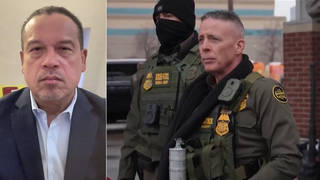
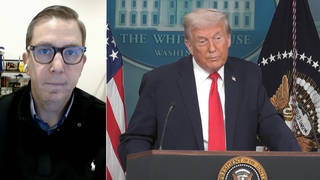
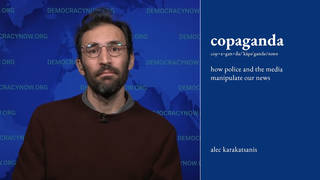
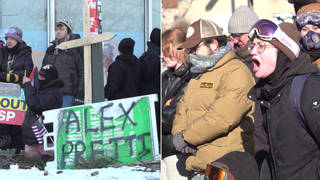





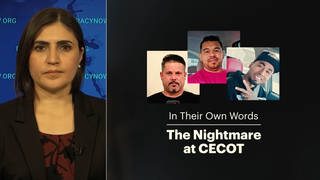

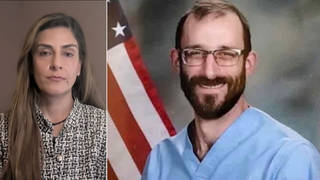
Media Options